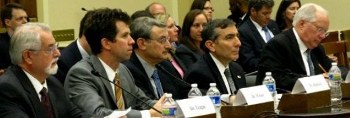
The NNI provides multi-agency coordination overseeing all federal nanotechnology research. The NNI supports the basic research and development of nanotechnology, which has resulted in U.S. leadership in the field, and is now looking to develop roadmaps in areas of critical national needs to maintain U.S. competitiveness. The NNI Supplement to the President’s Fiscal Year 2012 Budget includes funding requests from 15 federal agencies investing in nanotechnology, with over a 200 million dollar increase from FY10 levels (+11%). Significant increases have been requested for environmental, health and safety (EHS), solar energy conversion, sustainable nanomanufacturing, and nanoelectronics. In times of budgetary uncertainty, Congress makes efforts to ensure that federal programs provide economic impact. With nanotechnology and nanomanufacturing having the potential to become the next industrial revolution, having significant economic and societal impact, the subcommittee heard testimony supporting key priorities.
Since the last nanotechnology focused hearing held by the Science, Space, and Technology Committee three years ago, there have been numerous new developments in the field, along with industry indicators supporting the trends in jobs creation and economic impact. Witnesses discussed these developments, along with the coordination and planning necessary to ensure that participating agencies are effectively supporting programmatic and government objectives.
Testifying before the Subcommittee were:
- Dr. Clayton Teague, Director, National Nanotechnology Coordination Office
- Dr. Jeffrey Welser, Director, Nanoelectronics Research Initiative, Semiconductor Research Corporation
- Dr. Seth Rudnick, Chairman of the Board, Liquidia Technologies
- Dr. James Tour, Richard E. Smalley Institute for Nanoscale Science and Technology, Rice University
- Mr. William Moffitt, President and CEO, Nanosphere, Inc.
Broadly, the witnesses emphasized the need for Congress to continue robust funding for the National Nanotechnology Initiative (NNI) to ensure that the US remains the global leader in nanotechnology. As a comparison, other countries, such as Japan, China, and South Korea have increased their investment in nanotechnology, having shown corresponding increases in publication and patent rates. It was noted that by current estimates, the 2010 nanotechnology funding for the European Community totaled $2.6B US, exceeding the NNI total of $1.9B. The Subcommittee was encouraged maintain support for basic research while additionally promoting effective innovation and technology transfer. The example of expansion of public-private partnerships was provided as one effective model to accomplish this. The speakers from industry noted that NNI investments in their companies have resulted in significant private follow-on funding, job creation, and cost-saving product or process improvements making them commercially viable.
Expanding the discussion on the impact of an emerging nanotechnology industry and nanomanufacturing within the U.S. towards jobs creation, the recent study funded by the National Science Foundation (NSF) was cited projecting that 6 million nanotechnology workers will be needed worldwide by 2020, with 2 million of those jobs in the U.S. Dr. Clayton Teague, testified on the potential economic benefits of this emerging industry, cited the remarkable return on investment in terms of job creation and potential for future economic benefits. Teague further cited how the nanotechnology industry would create jobs for a broad cross section of workers having multi-disciplinary educational backgrounds that will be fill by graduates having college degrees as well as training and vocational programs, including community colleges and 2-year degrees. On a side note, Dr. Teague announced to the subcommittee that he was stepping down as Director of the NNCO this month. The NNN and the broader nanomanufacturing community would like to provide thanks to Dr. Teague for his hard work and efforts to make the NNI a reality, and wish him well in his future endeavors.
Reiterating the sentiment regarding economic impact from the nanomedicine sector, Dr. Seth Rudnick cited the undeniable potential to create entirely new industries and products that will positively impact society, improve quality of life and prevent disease. He further pointed out that the U.S. needs not only innovate, but additionally must scale our inventions to realize this potential, creating jobs, economic prosperity, and global competitiveness. Another point of discussion during the hearing was the relative importance of Environmental Health and Safety (EHS) activities associated with nanotechnology. The President's FY12 budget supplement increases spending on EHS by 36 percent over fiscal year 2010 levels. Addressing the issue of whether current federal and private research efforts are adequate to address concerns about EHS impacts of nanotechnology, Dr. James Tour, Professor of Chemistry, Computer Science and Mechanical Engineering and Materials Science at Rice University commented that the increased funding may not be justified and would be better spent on basic research, citing that basic research already incorporates a significant amount of EHS topics. Overall, the subcommittee hearing was a productive information-gathering opportunity in order to provide support for legislative decision making, prioritizing future spending leading to the realization of societal and economic benefits provided by nanotechnology.
image source: http://science.house.gov/press-release/subcommittee-explores-economic-benefits-federal-nanotechnology-initiative
